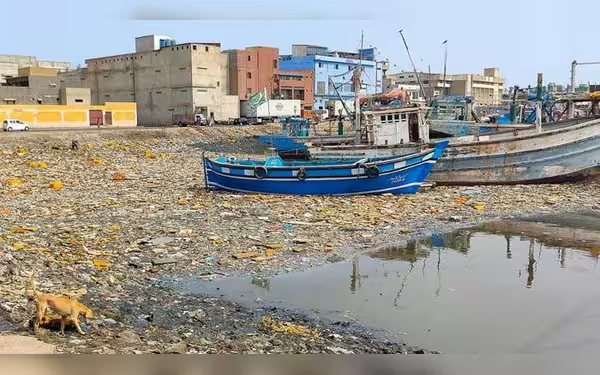Tuesday, July 2, 2024 03:45 PM
WWF Advisor Raises Concerns Over Karachi Port Pollution
- Karachi Port area likened to a 'dead zone' for marine life
- Extinction of crucial marine species due to severe pollution
- Urgent need for environmental conservation and sustainable practices
 Image Credits: thenews
Image Credits: thenewsA WWF technical advisor highlights severe pollution in Karachi Port, leading to the extinction of marine species and the urgent need for environmental conservation.
Concerns have been raised by a technical advisor from the World Wide Fund for Nature (WWF) regarding the alarming pollution levels in the vicinity of Karachi Port Trust (KPT). The area has been likened to a 'dead zone' for marine life due to human activities that have significantly impacted the ecosystem. At least 10 crucial marine species have faced extinction as a result of severe pollution in Karachi's port areas.
The main contributors to this environmental crisis include the release of approximately 500 million gallons of sewage into the sea daily, along with contaminated water from the Lyari and Malir rivers and other water bodies. This has led to substantial pollution spreading over a 10-kilometer radius outside the Karachi port, with areas like Gulbai and Machar Colony being particularly affected and devoid of marine life.
Historically, the Karachi port area was known for exporting oysters to New Delhi before 1947. However, the extinction of Lampshell, a living fossil, from locations like Baba Island, Bhit Shah, and KPT is directly linked to marine pollution in Karachi. Lampshell, which had survived in the ocean for 500 million years, could not withstand the pollution and is now locally extinct. The disappearance of the Arabian Pupfish, once abundant in Karachi's port area, further highlights the devastating impact of pollution on marine biodiversity.
Furthermore, humpback dolphins were sighted in Karachi's port areas until 1975, but they no longer visit the city due to sea pollution. The Caulerpa seaweed, once thriving at Manora beach, is now extinct in the city. Similarly, marine sponge in Shams Pir, an island in Karachi, has also vanished due to the adverse effects of pollution.
The decline of marine life in Karachi's port areas is a stark reminder of the urgent need for environmental conservation and sustainable practices. It is crucial for authorities and the community to take immediate action to address pollution and protect the marine ecosystem for future generations. By raising awareness and implementing effective measures, we can strive to restore the balance of nature and ensure a healthier environment for all living beings.













